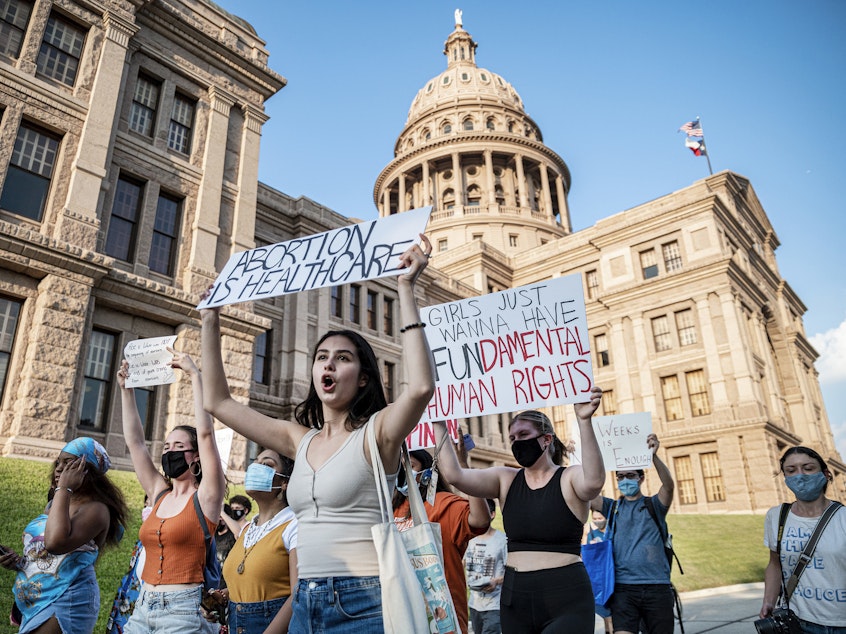Texas' abortion law is back in court

A federal judge is weighing arguments on the Justice Department's emergency request to block Texas' controversial new abortion law.
Department attorneys and lawyers for the state of Texas made their cases on Friday at a virtual hearing before Judge Robert Pitman of the U.S. District Court for the Western District of Texas. At stake is the ability of women in the country's second-largest state to get an abortion after about six weeks of pregnancy, a time before which many people don't realize they're pregnant.
"The state resorted to an unprecedented scheme of vigilante justice that was designed to scare abortion providers," argued Brian Netter, a lawyer for the Justice Department. "So far, it's working. Women have been left desperate, forced under sometimes harrowing circumstances to get out of Texas, if they even can."
In response, Texas lawyer Will Thompson replied, "I'm sorry to see that the federal government's pattern of hyperbole and inflammatory rhetoric has continued." Thompson described the new law and its design as "normal and lawful."
The hearing comes less than a month after the Justice Department sued Texas over the new abortion law known as SB 8. The department says the law is unconstitutional and violates the Supremacy Clause as well as the equal protection afforded under the 14th Amendment.
Sponsored
The new Texas law, which took effect Sept. 1, contains no exceptions for cases of rape, sexual abuse or incest.
And it includes a novel enforcement mechanism: It allows private citizens to bring civil suits against anyone who helps a woman get an abortion and to collect $10,000 in damages if they prevail in court.
In its lawsuit, the Justice Department said the bill's enforcement scheme is an unconstitutional attempt to sidestep judicial review and prevent women and providers from challenging the law in federal court.
Attorney General Merrick Garland warned when he announced the lawsuit that the Texas bill and its enforcement mechanism, if allowed to stand, could provide a model for other states to pass similar laws to restrict abortion or other constitutionally protected rights.
Texas has asked the judge to be specific if he decides to block the law
Sponsored
The Justice Department argued the law already has had "devastating effects," saying it "has gravely and irreparably impaired women's ability to exercise their constitutional right to an abortion across the state."
The department said some women have had to travel hundreds — sometimes thousands — of miles to neighboring states in order to terminate their pregnancy.
"One minor, who was raped by a family member, traveled eight hours from Galveston to Oklahoma to get an abortion," the department said in its filing.
It has also had an impact on the rights of women in other states, such as Oklahoma, Kansas, Colorado, Nevada and New Mexico, where Texas patients are frantically trying to get appointments, the department's filing said.
Texas has been urging the court to deny the federal government's motion and dismiss the case. Thompson, of the state attorney general's office, has asked the judge to be specific if he decides to block the law. Texas has signaled it wants to quickly seek appellate review if it loses in the lower court.
Sponsored
In its court papers, the state argued that the Justice Department hadn't met the legal threshold to warrant an emergency injunction and, more fundamentally, the state argued that the law is constitutional.
"The federal government has not clearly shown that the Texas Heartbeat Act is unconstitutional, that a preliminary injunction would remedy irreparable harm, or that the balance of equities and public interest favor extraordinary relief," the state said in its filing.
It also said the entire suit lacks merit because state authorities aren't the ones enforcing the new law since that falls on private citizens.
"The fact that private parties may rely on the challenged statute in other litigation does not create a case or controversy against the sovereign," Texas wrote. "It simply shows that those other cases would be the proper cases for deciding the constitutionality of the challenged statute."
So far, one abortion provider has come forward to say he performed the procedure after the Texas law took effect. He has been sued by several individuals, including Oscar Stilley, a disbarred attorney previously convicted of tax evasion, who made an appearance at the hearing Friday.
Sponsored
The judge offered no timetable for a decision
Pitman, who was nominated to the bench by former President Barack Obama, largely allowed the lawyers wide leeway to argue Friday, interrupting only a few times with questions.
To the Justice Department, the judge asked about any possible limits to the broad authority the federal government is claiming to sue the state. To Texas, Pitman wondered, "If the state's so confident" about the constitutionality of the limits on women's access to abortion, "why did it go to such great lengths" to fashion a private right to sue?
The judge thanked both sides and said he would take the issues under advisement. He offered no timetable for a decision.
"We will get to work on the appropriate order in this case," Pitman said. "Have a great rest of the day and weekend." [Copyright 2021 NPR]



